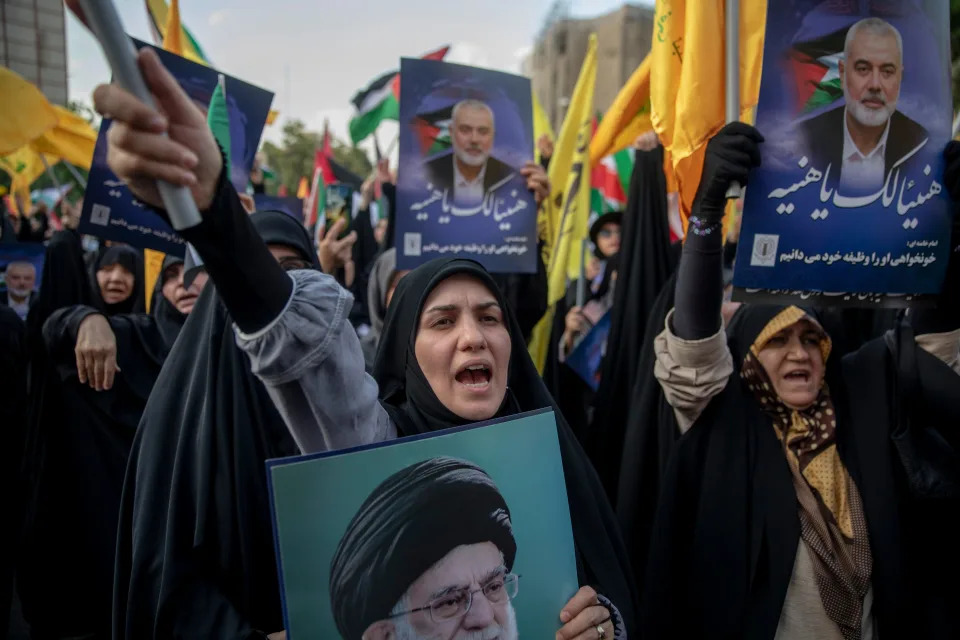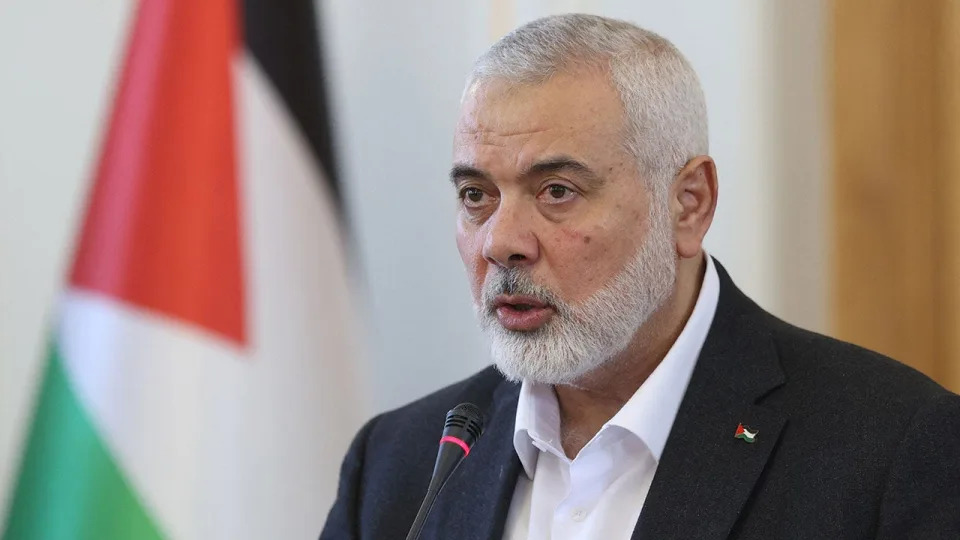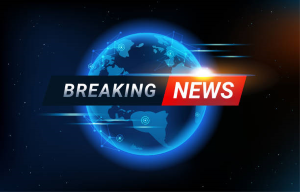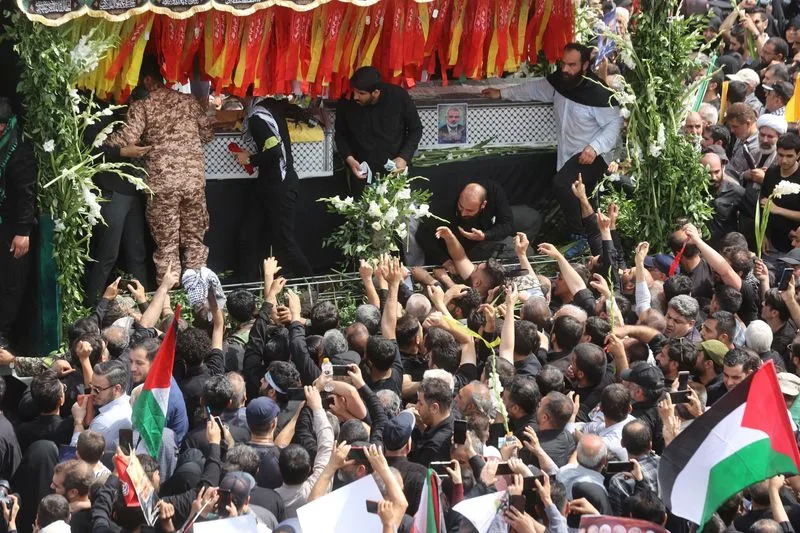The cornerstone of the Iranian regime's strategy for the elimination of Israel is its network of proxies — Hezbollah in Lebanon, Iraqi Shi’ite militias, Houthis in Yemen, and Hamas and Islamic Jihad in the Gaza Strip. The mission the Islamic Republic tasks these militias with is to wage a war of attrition against Israel. The strategy aims to gradually weaken Israel and eventually destroy it through executing a coordinated, multifront assault attack. All the while, the Iranian regime and its key assets remain shielded from direct retaliation. So far, the plan has served the Iranian regime well. And from its perspective, the plan has been progressing in the right direction.
Recent events, however, have dramatically altered the strategic landscape. The elimination of Fuad Shukr, Hezbollah’s strategic military leader, and considered the second-in-command followed a few hours later by the assassination of Hamas' political bureau chief Ismail Haniyeh in Tehran has reshuffled the deck regarding the Iranian threat to Israel. These high-profile killings have forced the Iranian regime into a difficult position, presenting two major dilemmas that require immediate decisions.

Iran now faces a major decision on how Hezbollah should respond to the recent Israeli strike in its stronghold of al-Dahiya, Beirut's southern suburbs and the operation center of Hezbollah. If Hezbollah retaliates by targeting major Israeli cities like Haifa or Tel Aviv, and causes significant damage to civilian lives and essential infrastructure, that could trigger a full-scale war. Iran wants to avoid this scenario for two main reasons:
First dilemma: Hezbollah’s response
-
Lebanon: A full-scale war could push Lebanon, already teetering on the edge of collapse, toward total disintegration. This would be detrimental to Iran, as Lebanon which is a façade state, effectively controlled by Iran and Hezbollah, is a vital foothold for both Iran and Hezbollah, serving as a base to extend their regional influence.
-
Hezbollah’s: A full-scale war that severely damages Hezbollah would severely weaken Iran’s most important and central proxy. For Tehran, Hezbollah has two primary missions: maintaining and entrenching Iranian control in Lebanon which also secures Iran’s foothold on the Mediterranean coast and deterring attacks on Iranian assets. Iran has resigned itself to the damage its Gaza proxy, Hamas has suffered, but it cannot afford to lose its most important proxy, Hezbollah. A full-scale war that would severely impact Hezbollah might even force Iran into a direct military confrontation with Israel, potentially escalating into a wider conflict involving the U.S.
Second dilemma: Direct retaliation against Israel
The Iranian regime must also decide whether to directly retaliate against Israel for the assassination of Haniyeh in Tehran, even though Israel has not claimed responsibility. This situation parallels Iran’s response on April 13-14, when it retaliated for the killing of senior Revolutionary Guard officers in Damascus, allegedly by Israel.
Iran’s considerations include:
-
Previous retaliation failure: The Iranian attack in April was largely thwarted by a U.S.-led coalition. Despite Israel’s measured response, the incident caused significant embarrassment for Iran.
-
Another Iranian attack on Israel might provoke an even harsher Israeli response.
-
Distance and risk: The recent powerful Israeli strike on Yemen’s Hodeida port, which is further from Israel than Iran is, demonstrates Israel’s ability to project power across long distances. This adds to the complexity of any potential Iranian retaliation.
As these words are being written, intense discussions are underway within Iran and with Hezbollah. The pressing issue is not whether an Iranian or proxy response is imminent, but what form it will take and what the outcome will be. The Hezbollah attack that killed Druze children in Majdal Shams on July 27 has already intensified tensions and reshuffled the deck, bringing the region close to a multi-front conflict.
AfriPrime App link: FREE to download...
https://www.amazon.com/Africircle-AfriPrime/dp/B0D2M3F2JT
Iran, its proxies will meet to discuss retaliation against Israel, say sources
Top Iranian officials will meet the representatives of Iran's regional allies from Lebanon, Iraq and Yemen on Thursday to discuss potential retaliation against Israel after the killing of the Hamas leader in Tehran, five sources told Reuters.
The region faces a risk of widened conflict between Israel, Iran and its proxies after Ismail Haniyeh's assassination in Tehran on Wednesday and the killing of Hezbollah's senior commander on Tuesday in an Israeli strike on the outskirts of the Lebanese capital Beirut.
Representatives of Iran's Palestinian allies Hamas and the Islamic Jihad, as well as Yemen's Tehran-backed Houthi movement, Lebanon's Hezbollah and Iraqi resistance groups will attend the meeting in Tehran, said the sources, who declined to be named due to the sensitivity of the issue.
"Iran and the resistance members will conduct a thorough assessment after the meeting in Tehran to find the best and most effective way to retaliate against the Zionist regime (Israel)," said a senior Iranian official, with direct knowledge of the meeting.
Another Iranian official said Supreme leader Ayatollah Ali Khamenei and senior members of Iran's elite Revolutionary Guards will attend.
"How Iran and the resistance front will respond is currently being reviewed ... This will certainly happen and the Zionist regime (Israel) will undoubtedly regret it," General Mohammad Baqeri, Iran's armed forces chief of staff, told state TV on Thursday.
Iran and Hamas have accused Israel of carrying out the strike that killed Haniyeh hours after he attended the inauguration of Iran's new president in Tehran on Wednesday.
But Israeli officials have not claimed responsibility for the attack that drew threats of revenge on Israel and fuelled further concern that the Israel-Hamas conflict in Gaza was turning into an all-out war in the Middle East.
Israeli air force chief Tomer Bar, speaking at a military graduation ceremony in Israel late on Wednesday, warned Israel will act against anyone planning to harm its citizens.
"We are also strongly prepared in defence. Hundreds of aerial defence soldiers, along with air control personnel, are stationed across the country with the best systems, ready to carry out their mission," said Bar.
Haniyeh and the leader of the Islamic Jihad, Ziad al-Nakhala, as well as senior representatives of Yemen's Tehran-backed Houthi movement and Lebanon's Hezbollah, attended the inauguration ceremony for Iran's new president in Tehran on Tuesday.
Hezbollah deputy leader Naim Qassim and lawmaker Hassan Fadlallah were in Iran for the inauguration and have remained there for the funeral and meeting, sources familiar with Hezbollah’s thinking said.
'MAJOR REPERCUSSIONS'
Hamas' armed wing has said in a statement Haniyeh's killingwould "take the battle to new dimensions and have majorrepercussions". Vowing to retaliate, Iran said the U.S. bore responsibility because of its support for Israel.
"Iran asked key commanders of the Iraqi resistance groups to travel to Tehran on Wednesday to attend an urgent meeting to discuss retaliation against recent Israeli strikes, including in Lebanon and Iran and the U.S. strike in Iraq,” said an Iraqi militia local commander.
Another militia source said the resistance group commanders left to attend Haniyeh's funeral and also to attend a "top urgent meeting" to decide the following steps to retaliate against Israel and the United States.
Iranians turned out to mourn Haniyeh on Thursday, a day after he was assassinated.
"All fronts of the resistance will take revenge for Haniyeh's blood," Ali Akbar Ahmadian, the secretary of Iran's Supreme National Security Council, told Iran's semi-official Mehr news agency.
The Iran-backed Axis of Resistance includes Hamas - the Palestinian group that ignited the war in Gaza by attacking Israel on Oct. 7- Lebanon's Hezbollah, Yemen's Houthis and various Shi'ite armed groups in Iraq and Syria. .
On April 13, Iran launched a barrage of missiles and drones at Israel in what it said was retaliation for Israel's suspected deadly strike on its embassy compound in Damascus on April 1, but almost all were shot down.
"Iran's response to the assassination of Martyr Haniyeh will be stronger than before," former senior Revolutionary Guards Commander Esmail Kosari told state TV.
AfriPrime App link: FREE to download...
https://www.amazon.com/Africircle-AfriPrime/dp/B0D2M3F2JT
Biden, Harris hold call with Netanyahu amid growing tensions in region
President Biden and Vice President Harris spoke with Israeli Prime Minister Benjamin Netanyahu on Thursday as tensions grow in the Middle East over the continued war in Gaza.
The White House, in a readout of the call, said Biden reaffirmed his commitment to Israel’s security against threats from Iran and proxy groups Hamas, Hezbollah and the Houthis.
“The President discussed efforts to support Israel’s defense against threats, including against ballistic missiles and drones, to include new defensive U.S. military deployments,” the White House said.
Biden also stressed the importance of the efforts to de-escalate broader tensions in the region, even as Israel faces threats from Iran for the assassination of a top Hamas leader in Tehran.
Ismail Haniyeh, one of the top Hamas leaders, was killed while visiting for the inauguration of Iran’s new president. Iran has vowed to seek revenge after his death, sparking concerns that the region will be plunged into an all-out war.
Israel has not claimed responsibility for the death, which was reported to The Associated Press and other outlets by Hamas and Iran.
Hours after Haniyeh’s death made news, Netanyahu gave defiant remarks and said Israel is achieving its goals.
Israel has faced growing criticism for the 10-month-long war in Gaza. Nearly 40,000 Palestinians have been killed, Gaza’s Health Ministry said, and most surviving Palestinians are without necessities like food, water and medical supplies.
Notably, the White House said Harris was on the call Thursday. Netanyahu recently gave a joint address to Congress, which Harris skipped. The address was just days after Biden withdrew from the presidential race and Harris kick-started her campaign.
Harris and Netanyahu met privately, where she told him it was time to get a cease-fire deal done. She’s already set to distinguish herself from Biden, offering a more empathetic approach to the civilians in Gaza.
AfriPrime App link: FREE to download...
https://www.amazon.com/Africircle-AfriPrime/dp/B0D2M3F2JT
Biden Promises Netanyahu ‘New US Defensive Military Deployments’
President Joe Biden promised Benjamin Netanyahu “new defensive US military deployments” as Israel faces fresh threats to avenge assassinations of Hamas and Hezbollah leaders, but he also pressed the Israeli leader to move forward with cease-fire efforts.
Biden “reaffirmed his commitment to Israel’s security against all threats from Iran, including its proxy terrorist groups Hamas, Hezbollah and the Houthis,” the White House said in a readout of a call Thursday evening. “The president discussed efforts to support Israel’s defense against threats, including against ballistic missiles and drones, to include new defensive U.S. military deployments.”
No further details were immediately offered.
Tempering the talk of military strength, the president “stressed the importance of ongoing efforts to de-escalate broader tensions in the region,’ according to the summary of the call, which was joined by Vice President Kamala Harris.
Netanyahu said earlier Thursday that his country “is in a very high level of preparedness” for efforts to avenge the two assassinations in one night of leaders from Hamas and Hezbollah.
‘Heavy Price’
“We will exact a very heavy price for any act of aggression against us from any arena,” Netanyahu said. He spoke after Iran’s Supreme Leader led prayers over the coffin of Ismail Haniyeh, the Hamas political chief killed in Tehran this week.
Biden told reporters that the assassinations have “not helped” the chances of a cease-fire and said he remains “very concerned” about the volatile situation in the Middle East.
“I had a very direct meeting with the prime minister, very direct,” Biden said. “We have the basis for a cease-fire. He should move on it and they should move on it now.”
Before Biden spoke, Iranian state TV showed Ayatollah Ali Khamenei leading the start of a funeral procession before Haniyeh’s coffin was driven into the city center through crowds waving Palestinian flags. Iran and Hamas say Haniyeh was killed by Israel. Netanyahu’s government hasn’t denied that charge and has vowed to kill all Hamas leaders following the group’s attack on the country on Oct. 7.
In Beirut, a similar procession was held for a high-ranking member of Hezbollah, Fuad Shukr, who was killed in the Lebanese capital by an Israeli missile Tuesday, just hours before Haniyeh’s death. Israel took responsibility for that one, saying it was in response to the killing of a dozen youths playing soccer in the Golan Heights on Saturday.
Amid conflicting reports about how Israel managed to strike Haniyeh in Tehran, the New York Times reported that he was killed by a bomb smuggled several months earlier into the guesthouse where he was staying. It cited seven Middle Eastern officials, including two Iranians, and an American official, all of whom it said spoke on condition of anonymity because of the sensitive details.
Israeli officials wouldn’t comment on that report. But the chief spokesperson for the Israel Defense Forces, Rear Admiral Daniel Hagari, may have indirectly corroborated it by saying that there was no airstrike “anywhere in the Middle East” after the one that killed the Hezbollah commander in Beirut.
Meanwhile, the Biden administration used intermediaries to send warnings to Iran, Hezbollah and the Houthis of Yemen not to escalate, according to people familiar with US policy. The US also counseled Israel on the need for caution in its next steps, the people said.
But pledges to respond for the two assassinations rang out — from Hamas, Hezbollah and their sponsor, Iran.
Hezbollah’s top leader, Hassan Nasrallah, said Thursday that the killings crossed his red line, saying the conflict now is an “open battle on all fronts.”
But he stopped short of declaring the killings to be an act of war and said his group fights both in anger and with “logic and wisdom,” reflecting the group’s declared intention not to widen the fighting with Israel.
Khamenei had earlier said that Iran has a “duty to seek vengeance” for Haniyeh’s death and Israel should expect a “severe punishment.”
US Secretary of State Antony Blinken echoed other world leaders in warning of the heightened risk to the region of the developing hostilities, which began in October with the invasion of Israel by Hamas militants that triggered the ongoing and brutal 10-month war in Gaza.
“It’s urgent that all parties make the right choices in the days ahead because those choices are the difference between staying on this path of violence, of insecurity, of suffering, or moving to something very different and much better,” Blinken said in Ulaanbaatar, Mongolia.
The US and others have been striving for a cease-fire between Israel and Hamas for months without success. A truce would likely see the release of Israeli hostages in exchange for Palestinian prisoners and allow for much-needed aid to be delivered into Gaza.
Thursday marks the 300th day of the war between Israel and Hamas, designated a terrorist organization by the US and European Union. Fighting continues unabated, with Israeli’s military reporting the striking of loaded launchers aimed at the country. On Wednesday, Israeli warplanes killed two journalists working for Al Jazeera, the Qatari-owned network.
Within Israel a debate has arisen over the wisdom of assassinations, which the military said now includes Mohammed Deif, Hamas’s second in command, in a strike in Gaza last month. Some back the government’s argument that they’re an effective tool to deter and weaken groups like Hamas and Hezbollah and lead them to soften their negotiating positions.
Writing in the Yedioth Ahronoth newspaper, commentator Avi Issacharoff praised the killings and said, “The Palestinian public that celebrated Oct. 7 and the ‘victory’ over Israel has now come to see that Hamas too is vulnerable and fragile. That can’t be hidden any longer; they can’t bask in their victory over Israel.”
But Michael Milshtein, a former intelligence officer who heads Palestinian studies at Tel Aviv University’s Dayan Center, said in a radio interview that even though the killing of Haniyeh is an important symbolic act, the key player in Hamas remains Yahya Sinwar, believed to be somewhere in Gaza and who, he says, is far more radical than Haniyeh and may be emboldened without his influence.
“It’s incorrect to say that Hamas doesn’t want a deal — but on its terms,” Milshstein said. “The ‘increased pressure’ doesn’t lead to softening of positions by Hamas. And we have to understand that.”
AfriPrime App link: FREE to download...
https://www.amazon.com/Africircle-AfriPrime/dp/B0D2M3F2JT
Netanyahu speaks out following deadly Israeli strikes against Iranian proxies
Israeli Prime Minister Benjamin Netanyahu issued a public video statement on Wednesday, speaking of recent significant blows dealt to the Iranian proxies.
Netanyahu spoke of Israel's recent targeting of Iran-backed Houthis, and a strike against a key Hezbollah commander, Fuad Shukr, who was killed on Tuesday in southern Beirut, Lebanon.
The prime minister made no mention of the deadly strike on Hamas political leader Ismail Haniyeh, for which Israel has not taken responsibility.
While nobody immediately claimed responsibility for the attack on Haniyeh in Tehran, Israel was quickly blamed after pledging to kill Haniyeh and other Hamas leaders over the terrorist group's Oct. 7 attack on the Jewish State.
Iranian Supreme Leader Ali Khamenei said it is "Iran's duty to avenge Haniyeh's blood because he was martyred on our soil."

Iran's embassy in the United Kingdom called for an emergency meeting of the United Nations Security Council following the assassination of Haniyeh.
The death of Haniyeh has raised alarms over the possibility of a wider regional war amid efforts to defuse escalating tensions in the Middle East.
U.S. Defense Secretary Lloyd Austin could not confirm if Israel was behind the strike nor if military intelligence had warned it would happen.
"I don't have anything for you on that. And we certainly have heard the reporting, but I don't have any additional information," Austin told reporters in Subic Bay, Philippines. He added the U.S. government would seek to ease tensions but that it would come to Israel's defense if the Jewish State is attacked.
Netanyahu said in his address that Israel will remain prepared for all scenarios, though the possibility of reaching a cease-fire deal is not off the table despite recent events.
AfriPrime App link: FREE to download...




